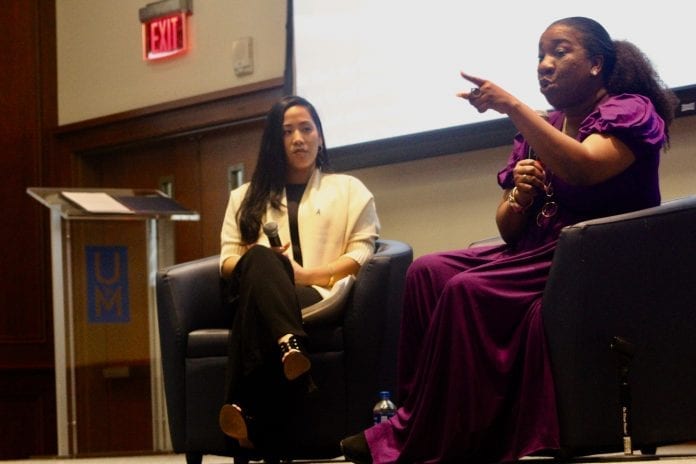by Harlan McCarthy, Special to The New Tri-State Defender
The face of the Me Too movement and one of Time magazine’s “100 Most Influential People” graced the University of Memphis Ballroom stage last Friday to share her “why” and her vision for the future of the movement.
Tarana Burke, introduced by mayoral candidate and Shelby County Commissioner Tami Sawyer, was in Memphis to close out the university’s Women’s History Month programming.
Burke started the Me Too movement in 2006 with the mission to help survivors of sexual violence find pathways to healing. Within a few years, the hashtag turned into a worldwide viral community, offering vital conversations both online and offline.
When asked by lecture host Hai Phuong Nguyen, an institutional equity specialist at the University of Memphis, what compels her to do this line of work, Burke said her focus on helping black survivors stemmed from her grandfather’s practice of Garveyism.
With a strong black feminist mother and Pan-African roots, it is no coincidence she read books from Audre Lorde, Toni Morrison and even Alex Haley’s “Roots” alongside her required Catholic school readings.
“It was fine for me to do that (enrollment in Catholic school) as long as I read a history book alongside the bible. In the seventh grade — after I finished “Roots” — he gave me a book called “Before the Mayflower” and another one called “They Came Before Columbus,” so I was into a lot of heavy stuff at an early age.”
Reading books by Ivan Van Sertima, who was a professor of African studies at Rutgers University and author of “They Came Before Columbus,” and Lerone Bennett Jr., a former executive editor of Ebony magazine and author of “Before the Mayflower,” as a child created a foundation that Burke called different from other children’s upbringing.
“I didn’t have the typical childhood where you go get ice cream with your granddaddy on Sunday. He would drive me down to Harlem to a record store where you used to be able to buy cassette tapes of scholars, so John Henrik Clarke and Dr. Ben-Jochannan would be on cassette. He would buy them and then we would drive around listening to them.”
Burke also credited her family for giving her a strong foundation which she used to identify injustices at an early age, whether it was questioning her childhood teachers on religion and history subjects or organizing in her community as part of the 21st Century Youth Leadership Movement.
The 21st Century Youth Leadership Movement was created around the 20th anniversary of the Voting Rights Act and the Selma to Montgomery commemorative march, with a mission to inspire and develop young people with mentoring training from a long list of veteran civil rights leaders.
“I grew up very active in social justice … 21C molded me,” said Burke.
That activism led Burke to co-found Just Be Inc., a program that promoted the wellness of teen girls, and was the catalyst for the Me Too movement.
“I had an experience a few years before with a young girl who had disclosed to me and I didn’t know what to do with it. That’s actually where I got the words ‘me too’ from because I couldn’t say it to her. I was 22 and this baby was 13 and had the courage to tell me what happened to her,” she said. “I was like ‘I don’t know what to do with that,’ but I also decided at that moment I didn’t want to be in that position again.”
Distressed with similar incidents, Burke started doing the legwork for the movement to go forward. In the past few years, her work has been connected to the incidents surrounding Harvey Weinstein and R. Kelly but Burke shies away from the Me Too reputation of taking down powerful men.
“This whole idea that Me Too is about taking down powerful men comes from the fact that the media focuses on one small piece of this work.”
Burke highlighted the PSAs which cover the stories of victims Emily Waters, Terry Crews, Daniela Contreras and an anonymous survivor. Burke said people like Crews have opened the door for men survivors.
“The first thing we have to do is engage men as survivors in this movement. The second thing is that everyone doesn’t identify as a man or a woman.
Burke said the book “The Body Keeps the Score” by Bessel van der Kolk helped her learn to compartmentalize shame when dealing with survivors and her own self-care, but admitted that she still has battles with finding joy.
“For those of us who don’t have access, for those of us who don’t have time, for those of us who are still trying to figure it out: you may have not gotten to that place yet. Think about the things that make your heart smile for a second.
“Protect it like it’s the thing that will save your life. I am in the process of just trying to get back to that. I think survival is a constant battle to get back to ourselves. Honestly, I don’t want to be the face of Me Too in five years. I want some young unicorn to come take this job.”
Closing out the lecture, Burke answered questions from activists, students and fans in the crowd. Questions ranged from more discussion on the movement and how to help those marginalized communities, the documentary “Surviving R. Kelly,” which details the sexual assault of young girls close to R. Kelly, and confessions from a student and fan about their own sexual abuse experiences and how they appreciated Burke’s commitment to helping survivors.




